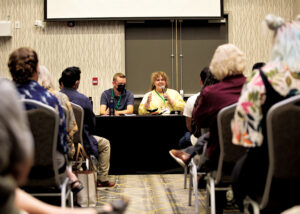With my colleague Doug being away on holidays, this past Sunday and next Sunday I’m going to try my hand at a two-part sermon series on some themes in the second and third letters of John. If you’ve read both letters you’ll know that they are probably two of the very shortest books in the Bible. And as I read second and third John this week I realized that both of two short books point back – intuitively enough – to the first letter of John. The first letter of John is a bit longer – almost four pages – and it seems like a more developed version of John’s second and third letters.
It’s important to remember that the three letters of John are not the same thing as the gospel of John. The first letter of John is a piece of writing with a great deal more content than the second two, but it is also a letter which isn’t organized in a very intuitive manner. The first letter of John is repetitive and convoluted, and from beginning to end it emphasizes the importance of Jesus Christ for the Christian faith, and the centrality of love in the Christian journey. According to some commentators the second and third books of John are just brief summaries of the first letter of John. In the shorter two letters the summary includes the importance of Christ and the centrality of love, and not much else aside from the usual greetings.
So I will focus on these two basic themes – Christ and love – how they are present in the text, and how we can bear them out in practice in our lives. First John chapter three verse 18 gives us this same encouragement, ‘Little children, let us love, not [just?] in word or speech, but in truth and action.’
The connection between Christ and love is very strong in John’s letters, and the text often emphasizes that the message of Christian love is not new or groundbreaking, but instead it is something old, and something that has been around since the beginning. I think that we are conditioned by our culture to believe that newer is better, and that we should be quick to jump on the bandwagon of a new health regimen or bible study, but the letters of John point to the idea that the truly meaningful and rich truths are the old ones, the ones that have been around since the beginning. I’m thinking here of ‘love your neighbour as yourself’ and even ‘do onto others as you would have them do onto you’. First John 3:11 reads ‘For this is the message you have heard from the beginning, that we should love one another’ and this appeal to beginnings occurs throughout the text of all three letters.
If we’re talking about love, and how love is the core of the Christian faith, then we can start to understand what love is by knowing what love is not, and we can do this by looking at the distinction between love and law. To treat someone else in a loving way is not to treat them in a law-like way. Some people have a law-like way of relating with others: if you do something good for me then I’ll do something good for you, or if you do something bad to me, I do something bad to you. The punishment matches the crime, and the reward matches the deed. This attitude is law-like because there is a 1 to 1 ratio, a cause and effect which repays good for good and bad for bad, and this is a principle which Christ came to abolish and surpass.
Loving others means leaving behind the attitude that puts fairness before grace. It’s very easy to police the boundaries of fairness, and to punish others for their bad behaviour or reward others for their good behaviour. But, love is more difficult and more complicated than that. Love isn’t fair or even, but excessive and radical. Love is defined by forgiveness and grace, and love does not expect repayment when a good deed is done.
I’m going to walk through a few guiding passages in first John chapter 4 to show some of the scriptural basis for our understanding of love. First John 4:19 reads ‘we love because he first loved us’ and this is the first gift God gives us, before anything else we are beloved children of God, and the text of John’s letters often addresses the reader in this way, saying ‘beloved’ or ‘beloved child’ before an admonition.
First John 4:7 reads ‘Beloved, let us love one another, because love is from God; everyone who loves is born of God and knows God. Whoever does not love does not know God, for God is love.’ This sentence is typical of John’s writing, which often sets up either/or scenarios for the reader. Commentators have noted that this sort of thinking occurs throughout John’s writings: the opposition of light and dark, good and evil, godly and worldly, etc. While I think this sort of thinking is a helpful learning tool, I think we should be wary of thinking in simple binary terms.
For example, on the surface John’s statement is simple that those who love know God, and those who don’t love don’t know God – this statement becomes complicated when my Muslim or Hindu or atheist neighbour shows love towards me. Then some things are called into question. Is the love that my non-Christian neighbour shows somehow sub-par because they don’t profess the same beliefs as me? Is the only true kind of love a Christian love with the Christian name? Or, does the love of God transcend even our human language, and our human religions? These are deep questions that hide under the surface of seemingly simple statements like ‘God is love.’
Moving on to first John 4:9 we hear ‘God’s love was revealed among us in this way: God sent his only son into the world so that we might live through him.’ This establishes Christ as our example for how to love others, and shows Christ to be God’s revelation and expression of love to the world. First John 4:10 reads ‘In this is love, not that we loved God but that he loved us and sent his son to be the atoning sacrifice for our sins.’ This puts the perfect love of God before the limited love that humans are capable of. First John 4:11 reads ‘Beloved, since God loved us so much, we also ought to love one another.’ This first gift of love from God means that our love for others is a response to the grace we have been shown, and we need to take seriously the task of modeling a Godly love to others, which is not necessarily the love that we see demonstrated in Hollywood, for example.
First John 4:12 reads ‘No one has ever seen God [but]; if we love one another, God lives in us, and his love is perfected in us.’ This shows us how important the work of love is because our love for others makes God manifest here on earth. Our love for others is the greatest witness, and it is the reason that others will want to become Christians – not our fantastic personalities or our great facilities or even our potlucks, but the love for others that we show – that’s the deciding factor in the future of the church.
Being loved by God first has some important consequences, and the letters of John just scratch the surface. This morning I would like to go deeper. In response to the love we have been shown, I hope that we as a church are able to receive the free gift of God’s love, and love others in the same way.
In receiving the free gift of love we do not act from a sense of duty or responsibility or even out of a sense of guilt, but we love others out of an appreciation for the love we have been shown. The love we have for others has the same character as the love God has shown us – Love is a gift. Like a birthday or Christmas present given to someone who you know didn’t buy you a gift in return, a gift given without thought of reward, whether in this life or the next, without even the reward of gratification, the reward of knowing you did your good deed for the day. Loving others in this way means that we must be prepared for love not to pay off, to be prepared to make nothing at all on our love-investment, and even to be prepared to lose everything for the sake of love.
To love others and to love God is to give a gift. Even our love for God must be lived out in the spirit of giving. If we only love God because we expect him to bless us, here on earth or in heaven, then we do not really love, we only engage in a sort of divine transaction – one which will ultimately be disappointed when we don’t get what we feel we deserve. We know that we don’t get what we deserve in life, and human free will dictates that good things don’t necessarily happen to good people. Getting what we deserve is a too way street, however, and although we may expect that our good deeds will be paid back to us, we don’t often expect our bad deeds to come back at us. Fortunately enough we don’t get what we deserve – we get more than we deserve through the love and forgiveness we are shown by God and others.
(1) To be loved by God is to receive a gift. (2) To love others is to give a gift. (3) To accept love from others is also to receive a gift. Some of us have a much harder time receiving love than giving it, and this might be because receiving the gift of love from others puts us in a vulnerable place, and makes us indebted to others. This debt can be uncomfortable if we are not used to it, and the vulnerability that we show when we receive love from others can also be uncomfortable because it leaves us open to hurt and betrayal. If we care about others and if we accept love from others we run the risk of not receiving love back in full. Chances are that our vulnerability and care may be met with the typical human imperfection that we all exhibit. This is why loving others is difficult work, and this is why the work of love is of the highest importance in the Christian walk.
Forgiveness and grace are gifts, as well, meaning that when we forgive others we run the risk of not being forgiven ourselves. When we show grace to others we run the risk of being taken advantage of, and even being used. This is where love gets tough, and this is where boundaries should be put up. If we are to forgive the person that offends against us, even seven times seventy times, then we are called to vulnerability. But, we are not called to put up with abuse of any kind – physical, emotional, sexual, or psychological. The love of Christ is a vulnerable love, but Christ also came to stand against injustice and oppression, and we’ll examine the ways Christ approached injustice next Sunday.
In the mean time, there is more to say about the distinction between love and law, and the attitude of love and the law-like attitude. There is an attitude out there that says ‘If I have accomplished something good then I must have earned it’. This attitude isn’t helpful, and it isn’t in line with Christ’s message. For example, it would be easy to look at our lives and say ‘I earned all the good things I have, with hard work, etc.’. It would be easy for us to look at the good things in our lives – children, jobs, the places where we live, our luxuries, our entertainment, or our free time – it would be easy to say that we earned these wonderful things on our own, to take credit, to give ourselves a pat on the back. However, this attitude is like the law-like attitude mentioned a moment ago because it expects that hard work will be repaid by plenty of good, but a quick read through the book of Job shows us that this isn’t always the case. This attitude of entitlement is problematic because it sees us as the only players in the field, and it doesn’t acknowledge the (often hidden) hand of God in our lives.
It is important to remember the ways in which we are provided for, and loved by God in our lives. It is easy to put all the emphasis on our human efforts, and surely our own efforts contribute to where we are in life, but we must also realize the ways that our lives have been affected by God’s provision. This provision has a multitude of different faces, from the people who helped us get the jobs we have, to the parents and grandparents who raised and taught us, to the stranger who helped us when we were in need. God acts in the world through the work of love, and the love of God comes to us in all sorts of circumstances.
One concrete circumstance that I can think of, in which God breaks into and is revealed in my life, is conversations – holy conversations in which we are encouraged by others, or in which we encourage others. These conversations that I have in mind are landmarks on the journey of faith. Maybe they represent a breakthrough where we receive new insight or advice about a tough scenario, maybe we are honest with others about our struggles or our joys, or maybe we get some help making a difficult decision to change our lives for the better – to give up that habit, to reconcile with that person we had a falling out with, to make a career change, to be honest about the secrets we keep, or to see the world in a new way.
To be honest, the second and third letters of John are not very helpful when looking for sermon material, and the first letter is even a bit tough. But, something that we find in the second and third letters of John is the following passage: ‘Although I have much to write to you, I would rather not use paper and ink; instead I hope to come to you and talk with you face to face, so that our joy may be complete.’ This verse highlights a vital aspect of the work of love – communication, and not communication as we have come to know it. Not a text message, not an email, and not even a voicemail, but a conversation, face to face. If love is our theme, and if Christ is our example, we can say that communication and conversation are vehicles for the work of love.
So let us do the hard work of love, forgiving, being vulnerable, not measuring or keeping track of rights and wrongs, but speaking the truth into each other’s lives like the writer of these letters.
Amen
See part two of the sermon here.







